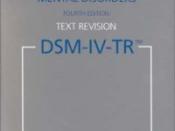Many, if not most clients for counseling have trouble with interpersonal relationships. This is either their central concern or part of a wider problem situation. Some of the difficulties clients have in their day-to-day relationships are also reflected in their relationships with counselors. For instance, if a person has a problem with being aggressive or angry with authority figures in day-to-day life, they often do the same with counselors, or if a person is passive outside of counseling sessions, they are often passive in the helping process. Therefore, the client's interpersonal style can be examined, to some extent, through an examination of his or her relationship with his or her counselor.
Counselors may also refer to the DSM to help guide them in their exploration with the client's problems. An example of a list from the DSM that a counselor may examine when diagnosing a patient with a problem is shown in the Table below.
Table Acute Stress Disorder Source: Diagnostic Criteria from DSM-IV (pg.231) Ray Commend Page 2 March 28,2001 A skill that is used to enable the counselor to explore their relationship with the counselor, and also to address problems with the progress of the sessions is called immediacy. Problems such as lack of direction in a session, tension, trust, diversity, or attraction can be reasons for immediacy. There are three kinds of immediacy that can be used in a session. First, there is immediacy that focuses on the overall relationship between the counselor and client. Second, there is immediacy that focuses on some particular event in a session. The third kind of immediacy involves self-involving statements that are present-tense, personal responses to the client.
I believe that the second immediacy technique is the most beneficial, because it focuses on the hear and now of the session...


